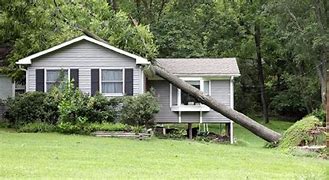1. Your homeowners insurance likely covers tree removal and damage repairs for your home and other insured structures, such as fences. A tree falls on your property and damages one or more insured structures. What now?
Your homeowners insurance will likely help with the cost of removing the tree and repairing the damage. That’s once you pay your deductible, of course. Examples of covered incidents can include strong winds knocking a tree over onto your roof or lightning striking a tree, causing it to fall on your fence. However, if a tree falls due to neglect, you may not receive any coverage. So keep your trees in good shape, and ask your neighbors to do the same.Your homeowners insurance will likely help with the cost of removing the tree and repairing the damage. That’s once you pay your deductible, of course. Examples of covered incidents can include strong winds knocking a tree over onto your roof or lightning striking a tree, causing it to fall on your fence. However, if a tree falls due to neglect, you may not receive any coverage. So keep your trees in good shape, and ask your neighbors to do the same.
2. If there’s no damage, there’s likely no insurance coverage.
You may assume your homeowners insurance will cover the removal costs of any fallen tree, but that isn’t always the case. If a tree falls on your property without damaging any insured structures, you will likely need to cover the costs of tree removal yourself.
3. Your city or municipality may clean up trees that fall into the street, but you may still have reason to file an insurance claim.
Check with your city or municipality to determine who’s responsible for removing a tree that falls into the street. If your city takes responsibility, it may only be for the portion that’s in the street. Any of the felled tree that’s left on your property will be your responsibility. Your insurance may help if an insured structure was damaged in the incident.
4. You may have coverage even if a tree falls from your neighbor’s property.
When a fallen tree damages your property, your homeowners insurance may pitch in no matter who owned the tree. Depending on the circumstances, your insurance carrier may attempt to recoup some of the costs, including your deductible, from your neighbor’s insurance. This may occur, for example, if the neighbor was negligent in caring for the tree before it fell.
5. Your car insurance may cover damage to your vehicle from a fallen tree.
If a tree falls from your property onto your car, it’s your car insurance and not your homeowners insurance that will likely help cover the cost of repairs. But, the tree doesn’t have to be from your property. You likely have coverage if a tree falls on your car, no matter from where. What may not be covered? The cost to remove the tree from atop your car. Of course, every insurance carrier handles fallen trees differently. It all depends on the specifics of your policy and your coverage limits, as well as the specifics of your situation.


